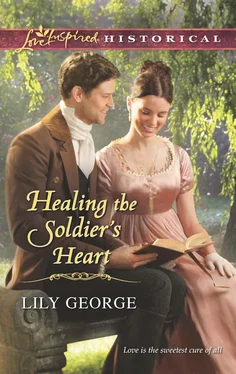Lucy walked with him to the bedroom door and ushered him out. Then she turned to Louisa, who sat, sniffling, her eyes red, her pallor dull.
“Don’t be mad, Lucy,” Louisa pleaded. “I want to help, and Dr. Phillips will be of assistance—I hope.” She plucked uncertainly at the coverlet, her flushed cheeks and sweaty brow betraying her illness.
Lucy sighed, sinking onto the foot of the bed. She could never stay mad at Louisa long, especially when she obviously felt so poorly. “I’m not angry with you, Louisa. And you’re right—Dr. Phillips can help a good deal more than any old Latin text we’ll find in your father’s library. But—the ensign is very proud. He might not like that we’ve spoken about him to Dr. Phillips without his consent. I shall have to handle this matter very carefully if I am not to offend him.”
Louisa gave a mighty sneeze, wiping her reddened nose on her embroidered handkerchief. “Oh, I’m sure you can find a way, Lucy. You’re so clever.”
Clever? Hardly. She gave a rueful inward chuckle. The only way she had managed her life thus far was to move into unfamiliar situations with wariness and crouch there until she became entirely comfortable. But this—this was different than trying to do well at the orphanage, or seeking a position as a governess. This meant meddling in another man’s life.
There was no guarantee that Ensign James Rowland would like or appreciate her interference, however good her intentions might be. He might be ashamed of her for discussing his impediment without his permission. Or he might be offended that Dr. Phillips was offering his services free of charge. The doctor’s offer might smack of charity to the ensign. And as a proud man, he might not be willing to accept it.
Or he could be angry on both counts.
She twirled a lock of her dark hair, staring out the window. Only one thing was certain. She must proceed with infinite caution.
* * *
“What ho, Rowland, it’s good to see you,” Cantrill said in a hearty tone of voice as he opened the door to his flat. “Come in, come in. My place is in a bit of uproar, pardon the mess. Mrs. Pierce is tidying up for my mother’s impending visit.”
Rowland stepped over the threshold, his hat in hand. Indeed, Cantrill’s flat—normally as neat and spare as a soldier would have it—was a welter of dusters, brooms, and carpet-beaters. Rowland shrugged and allowed Cantrill to lead him, zigzagging through the mess to the relative peace of the little parlor.
“What can I bring you? Tea? We’ll have to make it ourselves—Mrs. Pierce is far too busy at the moment to bother with refreshments, I’m afraid.” Cantrill motioned Rowland to a small chair near the hearth.
“Nothing...for me.” James cleared his throat and took a deep breath. He could speak to the lieutenant, it was true—but that didn’t mean his speech was free-flowing and unfettered. He must get to the heart of the matter. There was always the lurking fear that speech would elude him entirely if he took too long to come to the point.
Cantrill sat across from James, his normally pleasant face reflecting, perhaps, some of the confusion and exhaustion that his mother’s impending visit was causing in his flat. Funny, mothers could cause such mixed emotions. After all, James loved his mother and wanted to support her. But what if she were on her way to Bath right now to see him? He shuddered at the mere thought. No. He had definite sympathy for Cantrill today.
“I’ve come...about a job.” James cleared his throat again. “I must have—some occupation.”
Cantrill sat back in his chair and rubbed his hand across his brow. “Are you quite sure you’re ready for work, old fellow?”
The old anger and self-hatred began welling under the surface, causing James to swallow convulsively. “I’m not injured,” he muttered after an eternity.
“No, no of course not. But many of the other veterans, you know, are having a difficult time making this transition to civilian life. Some of them have elected to refrain from work for several months until they feel equal to the task of going to work every day.” Cantrill furrowed his brow, gazing over at him with a piercing gaze. “No need to rush things, you know.”
“I—I—I’m not.” James breathed deeply, calming the anger as it began bubbling over. Cantrill wasn’t meaning to condescend, after all. “Long p-p-past due. N-n-need to be useful for s-something.”
A flicker crossed Cantrill’s expression, as though he finally understood how very positive James was about seeking a position. “Very well,” he responded in a genial tone of voice. “What can you do?”
He paused. Not very much, he must admit. He’d been educated in the little country village with Mother bewailing their lost chances at Eton. But he liked the village and liked learning and had no desire to run off to boarding school with a lot of tony chaps who’d look at him as a charity case. And then he’d lied about his age and gone to war. He had very little to show for his life. But still, one had to say something.
“I—I—I don’t know, really,” he finally responded, his voice sounding sheepish even to his own ears. “S-something that doesn’t require s-speech, I imagine.”
Cantrill gave a rueful chuckle. “I should think some occupation with your hands would work well. Would you have any objection to working with a carpenter? There’s a fine one here in Bath, Henry Felton, who does quite a bit of cabinetry and the like. He was apprenticed during John Wood the Younger’s days and knows more about woodworking than anyone in the country, I wager.”
Working with his hands? Mother would perish at the thought, but the idea was strangely appealing. He’d only ever whittled a few things as a hobby, but the idea of building fine, strong furniture and cabinets—well, that gave a fellow something to do. And it would never matter whether he could utter a single syllable.
“I-I-Is F-Felton hiring?” A glimmer of hope welled in his chest.
“Yes. As a matter of fact, he came by the veterans’ group meeting about a fortnight ago, seeking to apprentice someone in his new shop. Felton had an assistant, but the fellow married and moved to Brighton. So he’s in need of someone to help—and quickly, too.” Cantrill glanced at the little mantel clock. “I’d step ’round there today, if I were you. Tell him you are one of the veterans. I’m sure he’d be more than happy to have you.”
“I—I—I’ll go n-now.” James rose, knocking his chair backward a few feet in his haste. “Apologies, L-L-Lieutenant.”
“Not at all. It matches the higgledy-piggledy nature of my entire flat.” Cantrill held out his hand with a grin. “Felton’s shop is located on Bennett, near the Assembly Rooms. Best of luck to you, Rowland. Though I am sure you won’t need it.”
James thanked the lieutenant and saw himself out of the flat. ’Twas midmorning, and the weather was fine enough for a walk. In a mere quarter of an hour, he would change his life.
As he strolled up Broad Street, his nervousness grew. Perhaps he wouldn’t be able to speak at all once he arrived. What then? Would he just stammer like an idiot?
He could turn back now. Head back to his comfortable life in the humble flat on Beau Street. He’d been such a failure that no one expected anything of him, besides Mother—and even her hopes were vague and rapidly dying. Cantrill had all but turned him away from seeking employment at first. That’s how very little everyone thought of him.
He paused, grasping the cool iron of a nearby fence rail until his knuckles whitened. He’d been a coward before. He’d never be one again. Even if he couldn’t utter a word to Felton, he’d find some way to communicate. Hand gestures. Writing on foolscap. Scratching words in the dirt. Anything to finally overcome this impediment and get on with his life.
Читать дальше












